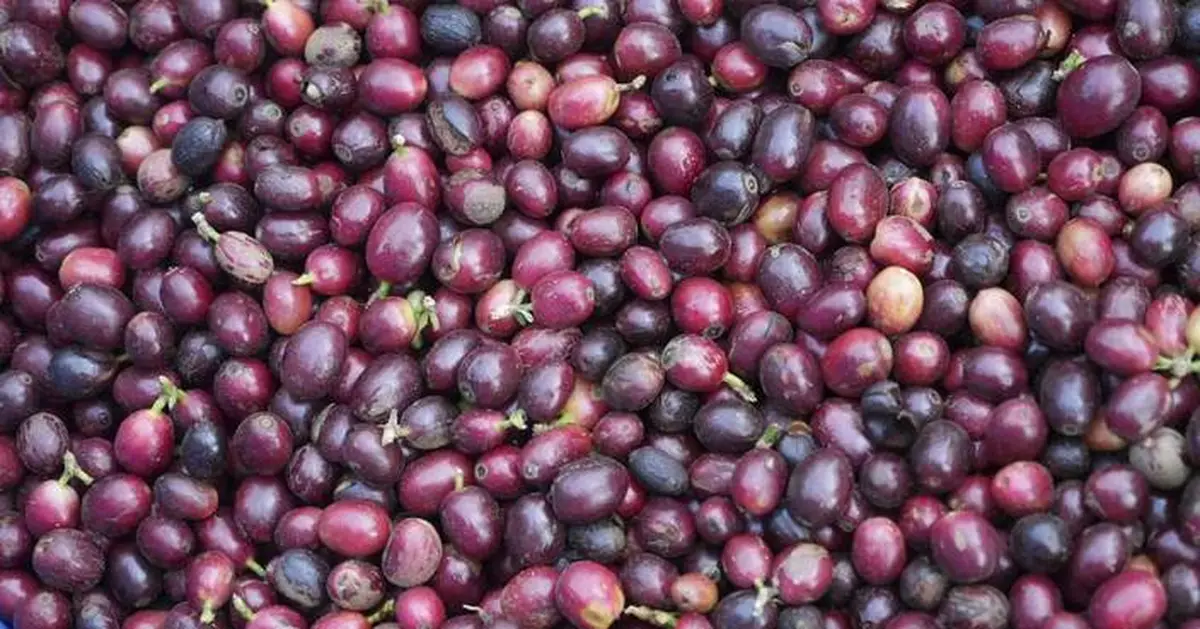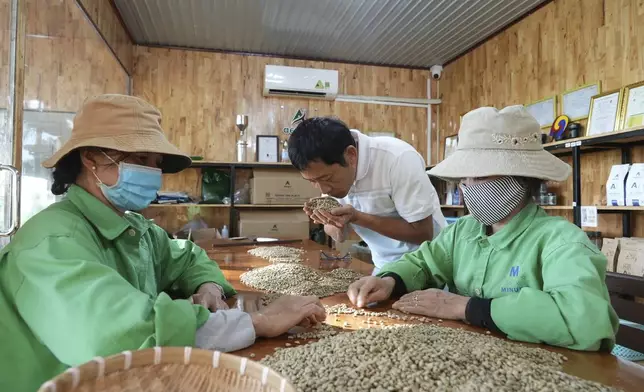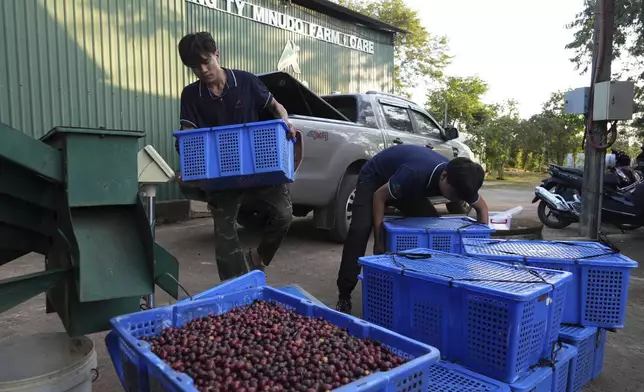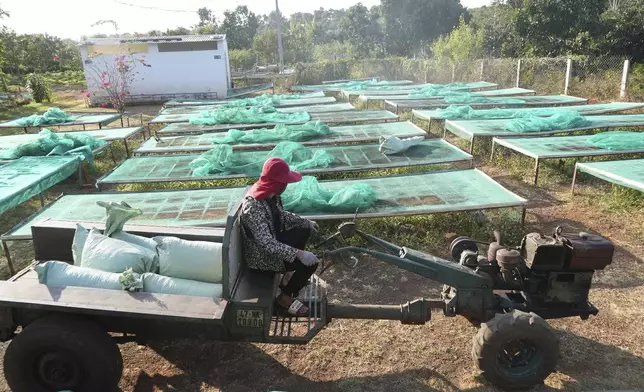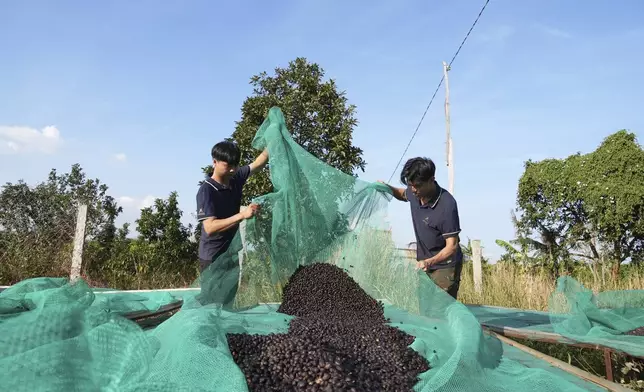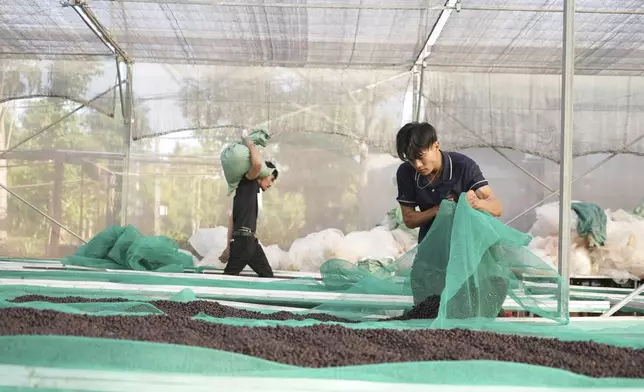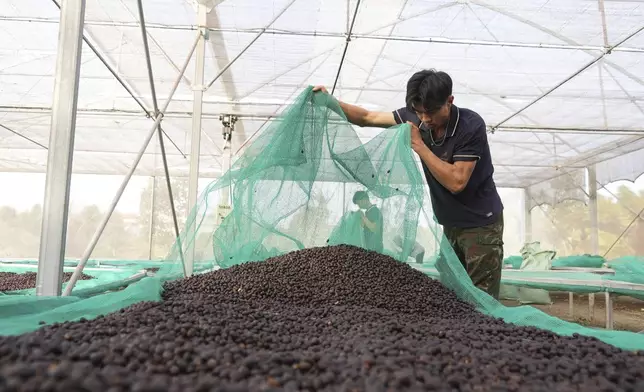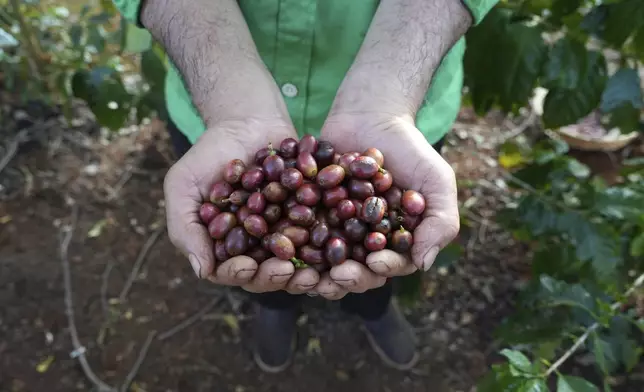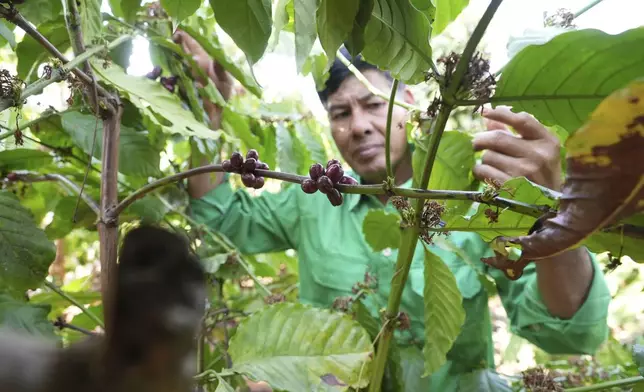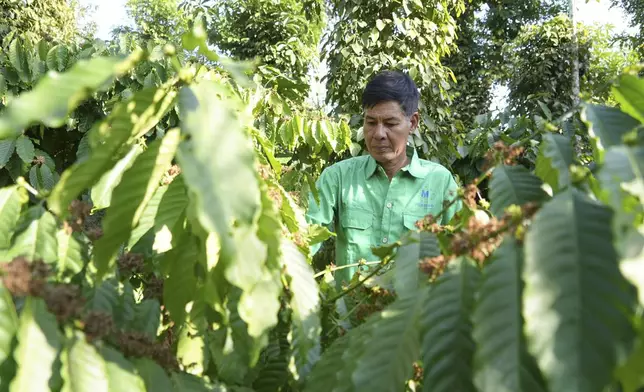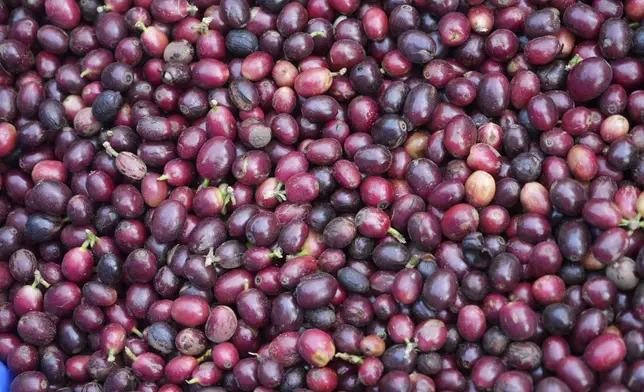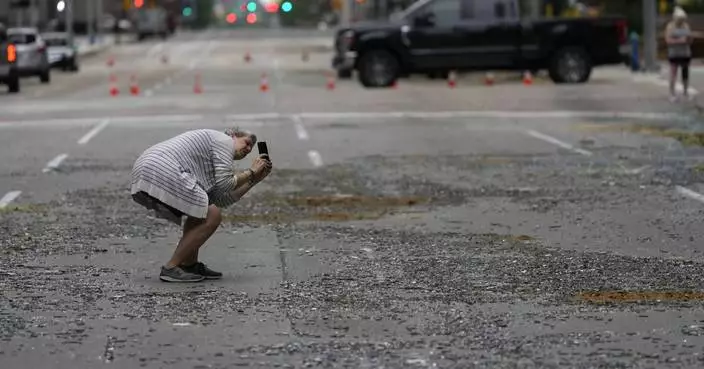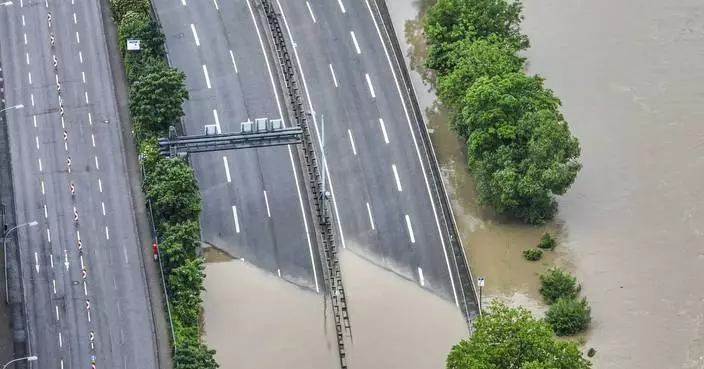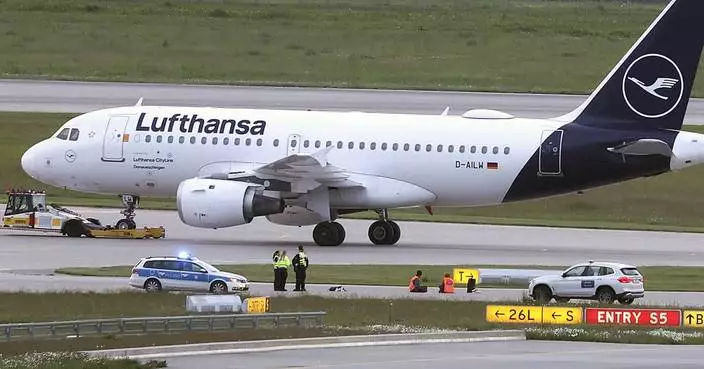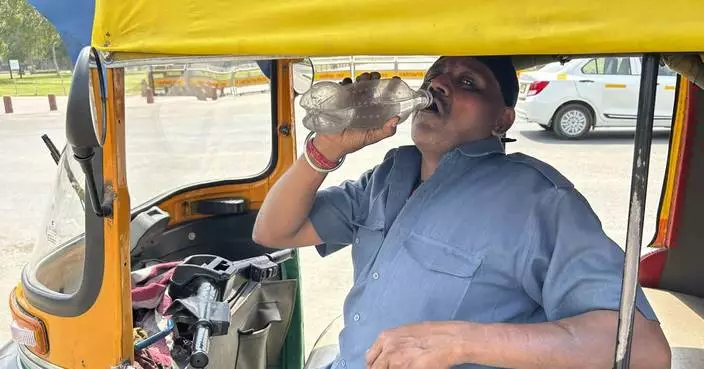BUON MA THUOT, Vietnam (AP) — Le Van Tam is no stranger to how the vagaries of global trade can determine the fortunes of small coffee farmers like him.
He first planted coffee in a patch of land outside Buon Ma Thuot city in Vietnam's Central Highland region in 1995. For years, his focus was on quantity, not quality. Tam used ample amounts of fertilizer and pesticides to boost his yields, and global prices determined how well he did.
Click to Gallery
BUON MA THUOT, Vietnam (AP) — Le Van Tam is no stranger to how the vagaries of global trade can determine the fortunes of small coffee farmers like him.
In the 1990s, Tam was among thousands of Vietnamese farmers who planted more than a million hectares of coffee, mostly robusta, to take advantage of high global prices. By 2000, Vietnam had become the second-largest producer of coffee, which provides a tenth of its export income.
Already, orders for Ethiopian grown coffee have fallen. And Peru lacks the capacity to provide information needed for coffee and cocoa grown in the Peruvian Amazon.
“We must choose the highest quality. Otherwise, we will always be laborers,” Tu said, while sipping a cup of his favorite coffee at his company's coffee processing factory adjoining Tam's farm. This is where trucks laden with red coffee cherries, both robusta and arabica, arrive from other farms, where the pulp of the fruit removed and beans of coffee laid out on tables to dry in the sun.
Brazil, the world’s largest coffee producer, is better placed, said Bellfield of Global Canopy, since its coffee grows on plantations that far are away from forests and it has a relatively well organized supply chain. Also, Brazilian-grown coffee is most likely to meet the EUDR requirements, according to a 2024 Brazilian study, because much of it is exported to the EU, Brazil has fewer small farmers, and about a third of its coffee growing acreage already has some kind of sustainability certification.
“That requires a huge amount of resources,” he said
A worker transports bags of coffee beans after drying at a coffee factory in Dak Lak province, Vietnam on Feb. 1, 2024. New European Union rules aimed at stopping deforestation are reordering supply chains. An expert said that there are going to be "winners and losers" since these rules require companies to provide detailed evidence showing that the coffee isn't linked to land where forests had been cleared. (AP Photo/Hau Dinh)
Workers dry coffee beans at a coffee factory in Dak Lak province, Vietnam on Feb. 1, 2024. New European Union rules aimed at stopping deforestation are reordering supply chains. An expert said that there are going to be "winners and losers" since these rules require companies to provide detailed evidence showing that the coffee isn't linked to land where forests had been cleared. (AP Photo/Hau Dinh)
Workers dry coffee beans at a coffee factory in Dak Lak province, Vietnam on Feb. 1, 2024. New European Union rules aimed at stopping deforestation are reordering supply chains. An expert said that there are going to be "winners and losers" since these rules require companies to provide detailed evidence showing that the coffee isn't linked to land where forests had been cleared. (AP Photo/Hau Dinh)
Workers dry coffee beans at a coffee factory in Dak Lak province, Vietnam, on Feb. 1, 2024. New European Union rules aimed at stopping deforestation are reordering supply chains. An expert said that there are going to be "winners and losers" since these rules require companies to provide detailed evidence showing that the coffee isn't linked to land where forests had been cleared. (AP Photo/Hau Dinh)
Farmer Le Van Tam holds up freshly picked coffee beans at a coffee farm in Dak Lak province, Vietnam on Feb. 1, 2024. New European Union rules aimed at stopping deforestation are reordering supply chains. An expert said that there are going to be "winners and losers" since these rules require companies to provide detailed evidence showing that the coffee isn't linked to land where forests had been cleared. (AP Photo/Hau Dinh)
Farmer Le Van Tam tends coffee plants at a coffee farm in Dak Lak province, Vietnam on Feb. 1, 2024. New European Union rules aimed at stopping deforestation are reordering supply chains. An expert said that there are going to be "winners and losers" since these rules require companies to provide detailed evidence showing that the coffee isn't linked to land where forests had been cleared. (AP Photo/Hau Dinh)
Farmer Le Van Tam tends coffee plants at a coffee farm in Dak Lak province, Vietnam on Feb. 1, 2024. New European Union rules aimed at stopping deforestation are reordering supply chains. An expert said that there are going to be "winners and losers" since these rules require companies to provide detailed evidence showing that the coffee isn't linked to land where forests had been cleared. (AP Photo/Hau Dinh)
Coffee beans are seen in basket after being picked at a coffee farm in Dak Lak province, Vietnam, on Feb. 1, 2024. New European Union rules aimed at stopping deforestation are reordering supply chains. An expert said that there are going to be "winners and losers" since these rules require companies to provide detailed evidence showing that the coffee isn't linked to land where forests had been cleared. (AP Photo/Hau Dinh)
Then, in 2019, he teamed up with Le Dinh Tu of Aeroco Coffee, an organic exporter to Europe and the U.S., and adopted more sustainable methods, turning his coffee plantation (field) into a a sun-dappled forest. The coffee grows side-by-side with tamarind trees that add nitrogen to the soil and provide support for black pepper vines. Grass helps keep the soil moist and the mix of plants discourages pest outbreaks. The pepper also adds to Tam's income.
“The output hasn’t increased, but the product’s value has,” he said.
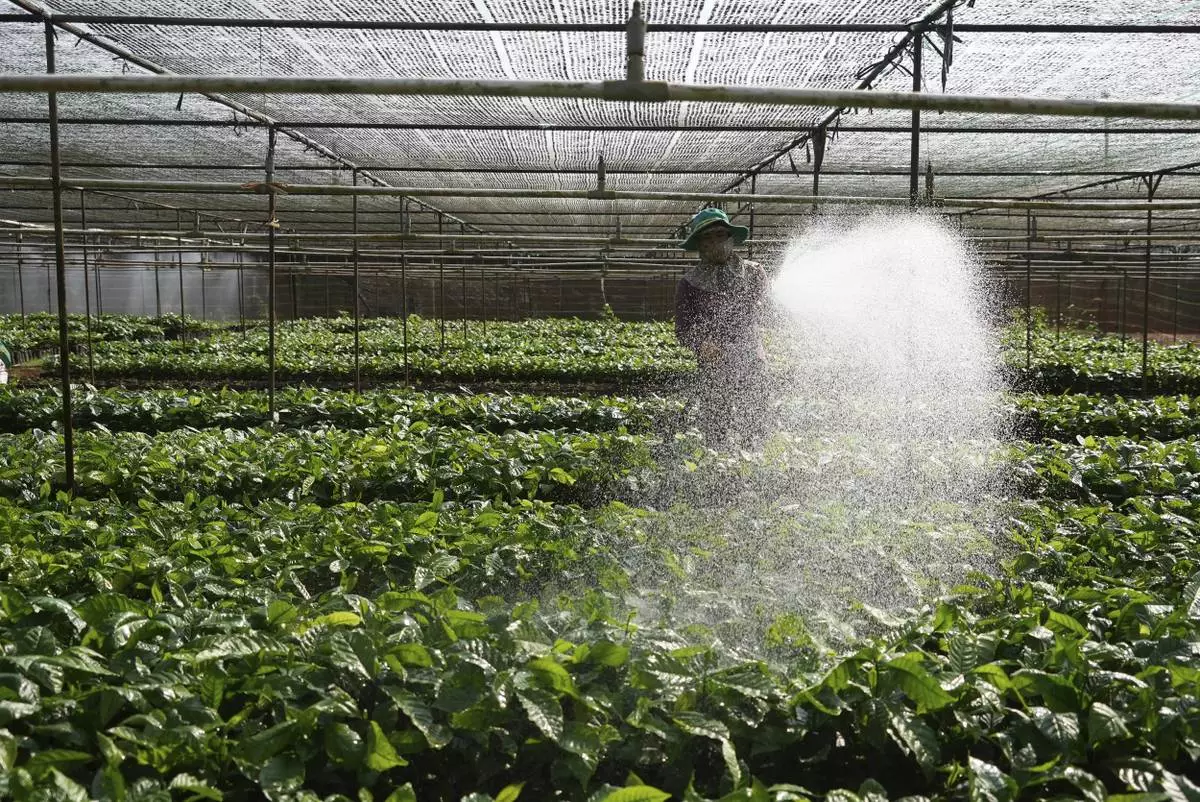
A worker waters coffee plants at a nursery garden in Dak Lak province, Vietnam on Feb. 2, 2024. New European Union rules aimed at stopping deforestation are reordering supply chains. An expert said that there are going to be "winners and losers" since these rules require companies to provide detailed evidence showing that the coffee isn't linked to land where forests had been cleared. (AP Photo/Hau Dinh)
In the 1990s, Tam was among thousands of Vietnamese farmers who planted more than a million hectares of coffee, mostly robusta, to take advantage of high global prices. By 2000, Vietnam had become the second-largest producer of coffee, which provides a tenth of its export income.
Vietnam is hoping that farmers like Tam will benefit from a potential reordering of how coffee is traded due to more stringent European laws to stop deforestation.
The European Deforestation Regulation or EUDR will outlaw sales of products like coffee from December 30, 2024, if companies can't prove they are not linked with deforestation. The new rules don't just seek to reduce risks of illegal logging and its scope is wide: It will apply to cocoa, coffee, soy, palm oil, wood, rubber, and cattle. To sell those products in Europe big companies will have to provide evidence showing they come from land where forests haven't been cut since 2020. Smaller companies have till July 2025 to do so.
It's not failsafe. Companies can just sell products that don't meet the new requirements elsewhere, without reducing deforestation. Thousands of small farmers unable to provide the potentially expensive data could be left out. Much depends on how countries and companies react to the new laws, Bellfield said. Countries must help smaller farmers by building national systems ensure their exports are traceable. Otherwise, companies may just buy from very large farms that can prove they have complied.
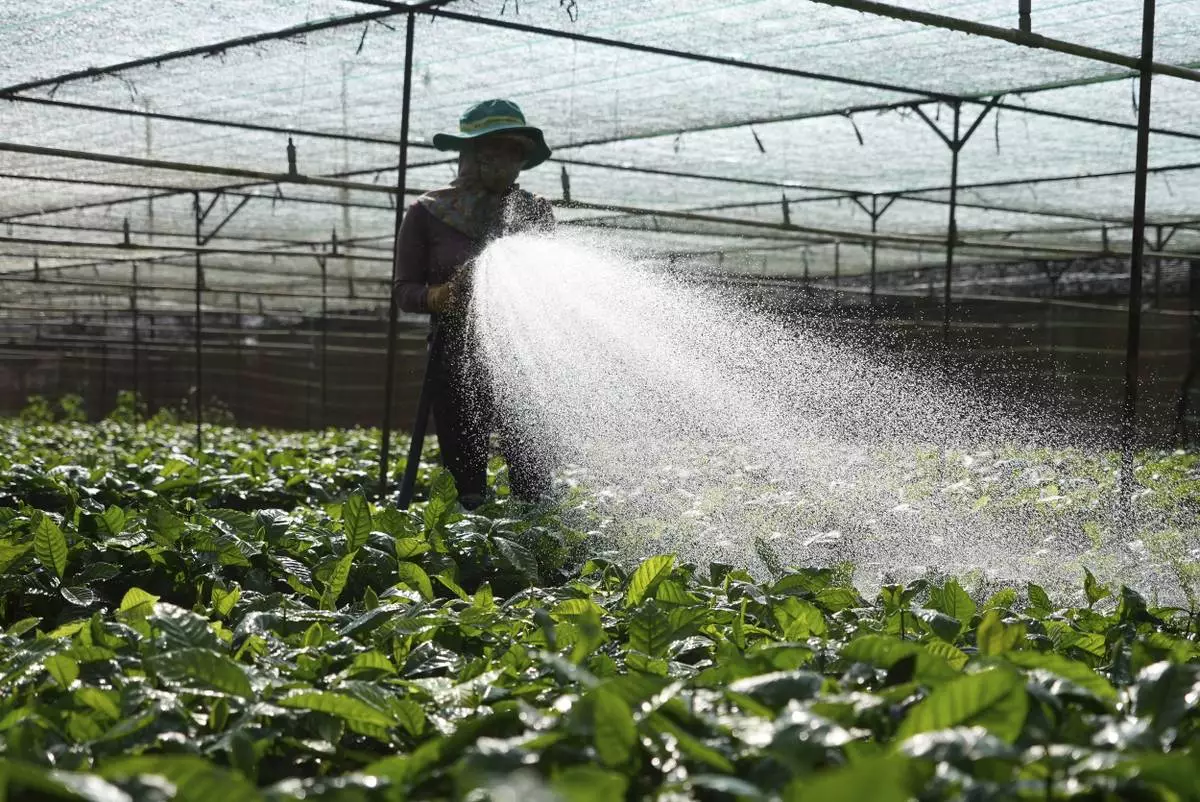
A worker waters coffee plants at a nursery garden in Dak Lak province, Vietnam, on Feb. 2, 2024. New European Union rules aimed at stopping deforestation are reordering supply chains. An expert said that there are going to be "winners and losers" since these rules require companies to provide detailed evidence showing that the coffee isn't linked to land where forests had been cleared. (AP Photo/Hau Dinh)
Already, orders for Ethiopian grown coffee have fallen. And Peru lacks the capacity to provide information needed for coffee and cocoa grown in the Peruvian Amazon.
This is on top of other challenges, which in Vietnam include worsening droughts and receding ground water levels.
“There will be winners and losers,” she said.
Vietnam can't afford to lose — Europe is the largest market for its coffee, comprising 40% of its coffee exports. Six weeks after the EUDR was approved, Vietnam's agriculture ministry started working to prepare coffee growing provinces for the shift. It has since rolled out a national plan that includes a database of where crops are grown and mechanisms to make this information traceable.
The Southeast Asian nation has long promoted more sustainable farming methods, viewing laws like the EUDR as an “an inevitable change," according to an August 2023 agriculture ministry communique. The EUDR could help accelerate such a transformation, according to agriculture minister Le Minh Hoang.
Tam and Tu, his export partner, were quick to adapt.
Even if the costs are higher, Tu said, they can get better prices for their high quality coffee

Workers sort and grade coffee beans at a coffee factory in Dak Lak province, Vietnam on Feb. 1, 2024. New European Union rules aimed at stopping deforestation are reordering supply chains. An expert said that there are going to be "winners and losers" since these rules require companies to provide detailed evidence showing that the coffee isn't linked to land where forests had been cleared. (AP Photo/Hau Dinh)
“We must choose the highest quality. Otherwise, we will always be laborers,” Tu said, while sipping a cup of his favorite coffee at his company's coffee processing factory adjoining Tam's farm. This is where trucks laden with red coffee cherries, both robusta and arabica, arrive from other farms, where the pulp of the fruit removed and beans of coffee laid out on tables to dry in the sun.
Tu already has certificates from international agencies for sustainability that will enable him to deal with the EUDR. Such certificates typically address the issue of deforestation, although some tweaks may be needed, said David Hadley, program director for regulatory impacts at the non-profit group Preferred by Nature in Costa Rica.
Ensuring that Vietnam's roughly half a million small farmers, who produce about 85% of its coffee, are able to collect and provide data showing their farms did not cause deforestation remains a challenge. Some may struggle to use smartphones to collect geolocation coordinates. Small exporters need to set up systems to prevent other uncertified products from being mixed with coffee that meets EUDR requirements, said Loan Le of International Economics Consulting.
Farmers also will need documents proving they have complied with national laws for land use, environmental protection and labor, Le said. Moreover, coffee's long value chain — from producing beans to collecting them and processing them — requires digital systems to ensure records are error-free.
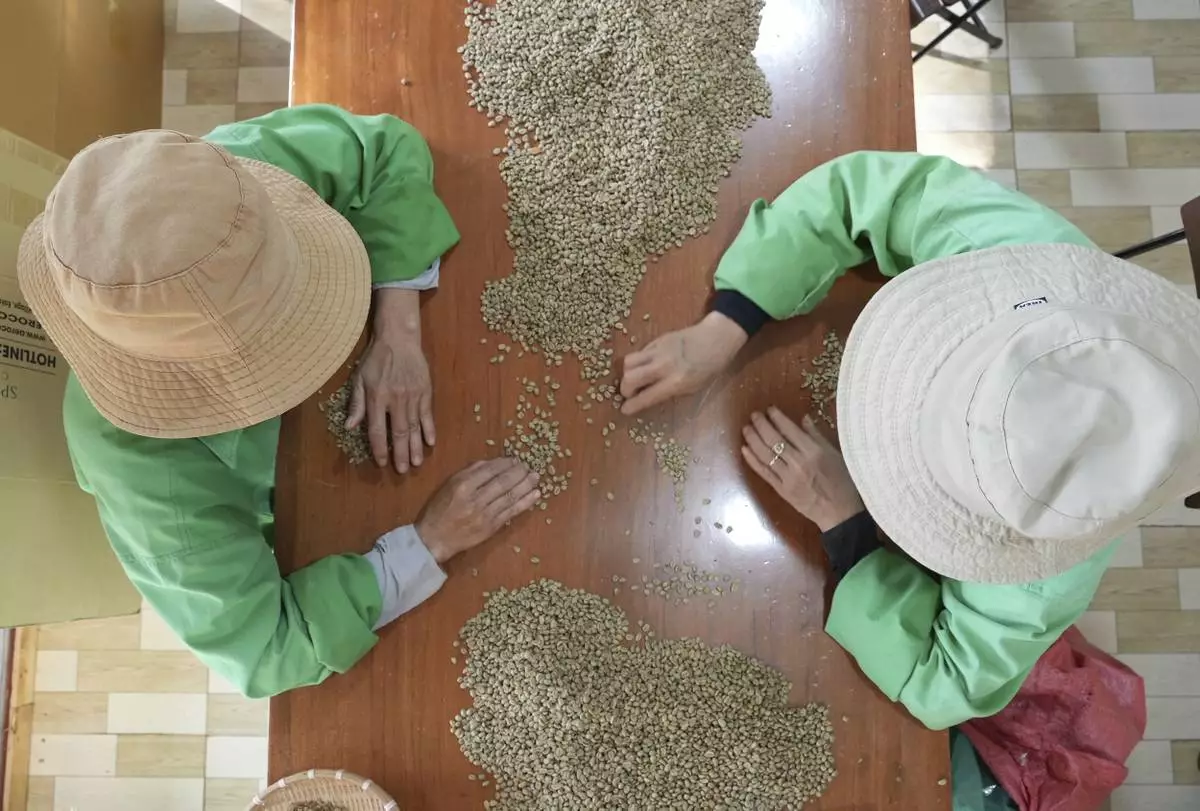
Workers sort and grade coffee beans at a coffee factory in Dak Lak province, Vietnam, on Feb. 1, 2024. New European Union rules aimed at stopping deforestation are reordering supply chains. An expert said that there are going to be "winners and losers" since these rules require companies to provide detailed evidence showing that the coffee isn't linked to land where forests had been cleared. (AP Photo/Hau Dinh)
Brazil, the world’s largest coffee producer, is better placed, said Bellfield of Global Canopy, since its coffee grows on plantations that far are away from forests and it has a relatively well organized supply chain. Also, Brazilian-grown coffee is most likely to meet the EUDR requirements, according to a 2024 Brazilian study, because much of it is exported to the EU, Brazil has fewer small farmers, and about a third of its coffee growing acreage already has some kind of sustainability certification.
The EUDR has acknowledged concerns for less well prepared suppliers by giving them more time and said the European government will work with impacted countries to “enable the transition” while “paying particular attention” to the needs of small holders and Indigenous communities. A review in 2028 will also look at impacts on smallholders.
"Despite this we still anticipate it being costly and difficult for small holder farming communities,” she said.
In Peru, collecting information about hundreds of thousands of small farmers is difficult given the country's weak institutions and the fact that most farmers lack land titles, according to a study of EUDR impacts by the Amazon Business Alliance, a joint-initiative by USAID, Canada and the nonprofit group Conservation International.
Ethiopia, where coffee makes up about a third of total export earnings according to a U.S. Department of Agriculture report, has been slow to react. The national plan it rolled out in February 2024 fails to resolve the fundamental issue of how to gather required data from millions of small farmers and provide that information to buyers, said Gizat Worku, head of the Ethiopian Coffee Exporters Association.
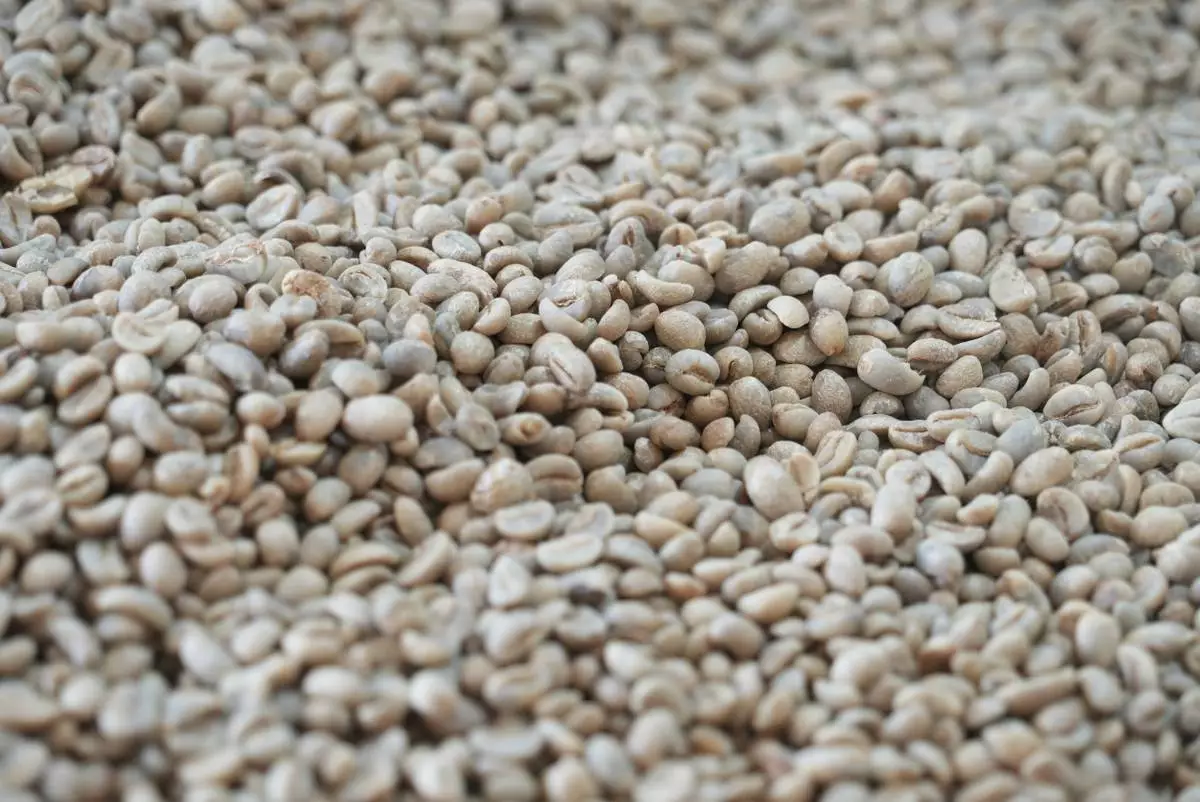
Coffee beans after being processed seen at a coffee factory in Dak Lak province, Vietnam, on Feb. 1, 2024. New European Union rules aimed at stopping deforestation are reordering supply chains. An expert said that there are going to be "winners and losers" since these rules require companies to provide detailed evidence showing that the coffee isn't linked to land where forests had been cleared. (AP Photo/Hau Dinh)
“That requires a huge amount of resources,” he said
Gizat, who like many Ethiopians goes by his first name, said that orders are falling due to doubts about the country's ability to comply with the EUDR. Some traders are contemplating switching to other markets, like the Middle East or China, where Ethiopian coffee is “booming,” he said. But switching markets isn't easy.
“These regulations are going to have a tremendous impact,” Gizat said.
The Associated Press’ climate and environmental coverage receives financial support from multiple private foundations. AP is solely responsible for all content. Find AP’s standards for working with philanthropies, a list of supporters and funded coverage areas at AP.org.

Workers unload baskets of freshly picked coffee beans at a coffee factory in Dak Lak province, Vietnam on Feb. 1, 2024. New European Union rules aimed at stopping deforestation are reordering supply chains. An expert said that there are going to be "winners and losers" since these rules require companies to provide detailed evidence showing that the coffee isn't linked to land where forests had been cleared. (AP Photo/Hau Dinh)

A worker transports bags of coffee beans after drying at a coffee factory in Dak Lak province, Vietnam on Feb. 1, 2024. New European Union rules aimed at stopping deforestation are reordering supply chains. An expert said that there are going to be "winners and losers" since these rules require companies to provide detailed evidence showing that the coffee isn't linked to land where forests had been cleared. (AP Photo/Hau Dinh)

Workers dry coffee beans at a coffee factory in Dak Lak province, Vietnam on Feb. 1, 2024. New European Union rules aimed at stopping deforestation are reordering supply chains. An expert said that there are going to be "winners and losers" since these rules require companies to provide detailed evidence showing that the coffee isn't linked to land where forests had been cleared. (AP Photo/Hau Dinh)

Workers dry coffee beans at a coffee factory in Dak Lak province, Vietnam on Feb. 1, 2024. New European Union rules aimed at stopping deforestation are reordering supply chains. An expert said that there are going to be "winners and losers" since these rules require companies to provide detailed evidence showing that the coffee isn't linked to land where forests had been cleared. (AP Photo/Hau Dinh)

Workers dry coffee beans at a coffee factory in Dak Lak province, Vietnam, on Feb. 1, 2024. New European Union rules aimed at stopping deforestation are reordering supply chains. An expert said that there are going to be "winners and losers" since these rules require companies to provide detailed evidence showing that the coffee isn't linked to land where forests had been cleared. (AP Photo/Hau Dinh)

Farmer Le Van Tam holds up freshly picked coffee beans at a coffee farm in Dak Lak province, Vietnam on Feb. 1, 2024. New European Union rules aimed at stopping deforestation are reordering supply chains. An expert said that there are going to be "winners and losers" since these rules require companies to provide detailed evidence showing that the coffee isn't linked to land where forests had been cleared. (AP Photo/Hau Dinh)

Farmer Le Van Tam tends coffee plants at a coffee farm in Dak Lak province, Vietnam on Feb. 1, 2024. New European Union rules aimed at stopping deforestation are reordering supply chains. An expert said that there are going to be "winners and losers" since these rules require companies to provide detailed evidence showing that the coffee isn't linked to land where forests had been cleared. (AP Photo/Hau Dinh)

Farmer Le Van Tam tends coffee plants at a coffee farm in Dak Lak province, Vietnam on Feb. 1, 2024. New European Union rules aimed at stopping deforestation are reordering supply chains. An expert said that there are going to be "winners and losers" since these rules require companies to provide detailed evidence showing that the coffee isn't linked to land where forests had been cleared. (AP Photo/Hau Dinh)

Coffee beans are seen in basket after being picked at a coffee farm in Dak Lak province, Vietnam, on Feb. 1, 2024. New European Union rules aimed at stopping deforestation are reordering supply chains. An expert said that there are going to be "winners and losers" since these rules require companies to provide detailed evidence showing that the coffee isn't linked to land where forests had been cleared. (AP Photo/Hau Dinh)
KYIV, Ukraine (AP) — A divisive mobilization law in Ukraine came into force on Saturday, as Kyiv struggles to boost troop numbers after Russia launched a new offensive that some fear could close in on Ukraine’s second-largest city.
The legislation, which was watered down from its original draft, will make it easier to identify every conscript in the country. It also provides incentives to soldiers, such as cash bonuses or money toward buying a house or car, that some analysts say Ukraine cannot afford.
Lawmakers dragged their feet for months and only passed the law in mid-April, a week after Ukraine lowered the age for men who can be drafted from 27 to 25. The measures reflect the growing strain that more than two years of war with Russia has had on Ukraine’s forces, who are trying to hold the front lines in fighting that has sapped the country’s ranks and stores of weapons and ammunition.
Ukrainian President Volodymyr Zelenskyy also signed two other laws Friday, allowing prisoners to join the army and increasing fines for draft dodgers fivefold. Russia enlisted its prisoners early on in the war, and personnel shortages compelled Ukraine to adopt the new, controversial measures.
Oleksii, 68, who runs a car repair shop in Kyiv, worries his business will have to shut down as he expects 70% of his workers will be mobilized. He asked that only his first name be used to allow him to speak freely.
“With the new law, people will be mobilized and we will have to shut down and stop paying taxes,” Oleksii told The Associated Press on Saturday. He said it's very difficult to replace workers because of their specialized skills. Most of them are already in the armed forces, he said, adding that the law is “unfair” and “unclear.”
Even essential municipal services will be affected. Viktor Kaminsky, the head of a municipal service department in Kyiv that fits households with heating and repairs utilities in public buildings, said he will struggle to replace mobilized staff and meet demand, even though the law allows him to retain half of workers deemed fit for service.
He said 60 of the 220 people working in Kaminsky's department will be eligible to be called up. “If they take 30 people from what we have, the problem is we don’t have anyone to replace them," he said.
“There are pros and cons to this law,” Kaminsky said. “It's hard to avoid the mobilization process now, compared to before when people were trying to get around it.” But, he said, it would be better if essential workers like his were granted more exemptions.
Ukraine has struggled for months to replenish depleted forces, as Russian troops are pushing ahead with a ground offensive that opened a new front in the northeast and put further pressure on Kyiv’s overstretched military. After weeks of probing, Moscow launched the new push knowing that Ukraine suffered personnel shortages, and that its forces have been spread thin in the northeastern Kharkiv region.
Russian President Vladimir Putin said on Friday during a visit to China that the Russian push aims to create “a buffer zone” rather than capturing Kharkiv, the local capital and Ukraine’s second-largest city.
Still, Moscow’s forces have pummeled Kharkiv with strikes in recent weeks, hitting civilian and energy infrastructure and prompting angry accusations from Zelenskyy that the Russian leadership sought to reduce the city to rubble. On Friday, Mayor Ihor Terekhov said that Russian guided bombs killed at least three residents and injured 28 others that day.
Moscow denies deliberately targeting civilians, but thousands have died or suffered injuries in the more than 27 months of fighting.
The U.S. last week announced a new $400 million package of military aid for Ukraine, and President Joe Biden has promised that he would rush badly needed weaponry to the country to help it stave off Russian advances. Still, only small batches of U.S. military aid have started to trickle into the front line, according to Ukrainian military commanders, who said it will take at least two months before supplies meet Kyiv’s needs to hold the line.
Rusyn is the head of recruitment for the 3rd Assault Brigade, one of the most popular among Ukrainian volunteers. He told AP that he saw a 15% increase in men joining the brigade, which fights in eastern Ukraine, in the past months. Most recruits are aged between 23-25, he said. For security reasons, he and his recruits asked to be identified by their call signs only.
“There is no alternative (to mobilization),” said Rohas, a 26-year old recruit. “One way or another, I believe that most men will end up in the ranks of the armed forces and by joining as a volunteer, you still get some preferences.”
“Those who are afraid of being mobilized are not the ones hostage to this situation, it's those (soldiers) who are standing in formations of three where there should be 10. Those guys are hostages to this situation and they should be replaced, so that’s why we are here," Rohas said.
Many Ukrainians have fled the country to avoid the draft since Russia’s all-out invasion in February 2022.
The Supreme Court last month said that 930 people were convicted of avoiding mobilization in 2023, a fivefold increase from the previous year.
Around 768,000 Ukrainian men aged 18-64 had been granted temporary protection in European Union countries as of last November, according to data from the bloc's statistical agency, Eurostat.
Kyiv has barred men under 60 from leaving the country since the start of the war, but some are exempt, including those who are disabled or have three or more dependents. The Eurostat data does not specify how many of the men who have qualified for protection belong to these categories, nor how many others reached the EU from Ukraine's Russian-occupied territories in the east and south.
Unable to cross the border legally, some Ukrainian men risk death trying to swim across a river that separates Ukraine from neighboring Romania and Hungary.
Late on Friday, Ukraine’s border service said that at least 30 people have died trying to cross the Tisza River since the full scale-invasion.
Romanian border guards days earlier retrieved the near-naked, disfigured body of a man that appeared to have been floating in the Tisza for days, and is the 30th known casualty, the Ukrainian agency said in an online statement. It said the man has not yet been identified.
Kozlowska reported from London. Associated Press writer Alex Babenko in Kyiv, Ukraine contributed to this report.
——
Follow AP’s coverage at https://apnews.com/hub/russia-ukraine

Newly recruited soldiers of the 3rd assault brigade train in Kyiv, Ukraine, Friday, May 17, 2024. A divisive mobilisation law in Ukraine came into force on Saturday, as Kyiv struggles to boost troop numbers after Russia launched a new offensive. (AP Photo/Efrem Lukatsky)

Newly recruited soldiers of the 3rd assault brigade train in Kyiv, Ukraine, Friday, May 17, 2024. A divisive mobilisation law in Ukraine came into force on Saturday, as Kyiv struggles to boost troop numbers after Russia launched a new offensive. (AP Photo/Efrem Lukatsky)

A newly recruited soldier of the 3rd assault brigade trains, in Kyiv, Ukraine, Friday, May 17, 2024. A divisive mobilisation law in Ukraine came into force on Saturday, as Kyiv struggles to boost troop numbers after Russia launched a new offensive. (AP Photo/Efrem Lukatsky)

Newly recruited soldiers of the 3rd assault brigade train in Kyiv, Ukraine, Friday, May 17, 2024. A divisive mobilisation law in Ukraine came into force on Saturday, as Kyiv struggles to boost troop numbers after Russia launched a new offensive. (AP Photo/Efrem Lukatsky)

Newly recruited soldiers of the 3rd assault brigade train in Kyiv, Ukraine, Friday, May 17, 2024. A divisive mobilisation law in Ukraine came into force on Saturday, as Kyiv struggles to boost troop numbers after Russia launched a new offensive. (AP Photo/Efrem Lukatsky)

Oleksii, 68, director of the auto repair shop poses for photo in Kyiv region, Ukraine, Saturday, May 18, 2024. A divisive mobilisation law in Ukraine came into force on Saturday, as Kyiv struggles to boost troop numbers after Russia launched a new offensive. (AP Photo/Alex Babenko)

A newly recruited soldier of the 3rd assault brigade trains, in Kyiv, Ukraine, Friday, May 17, 2024. A divisive mobilisation law in Ukraine came into force on Saturday, as Kyiv struggles to boost troop numbers after Russia launched a new offensive. (AP Photo/Efrem Lukatsky)

Smoke rises after a Russian attack in Kharkiv, Ukraine, Friday, May 17, 2024. (AP Photo/Evgeniy Maloletka)

People walk on a street while smoke rises after a Russian attack in Kharkiv, Ukraine, Friday, May 17, 2024. (AP Photo/Evgeniy Maloletka)

Foreign journalists report from an observation point while smoke rises after a Russian attack in Kharkiv, Ukraine, Friday, May 17, 2024. (AP Photo/Evgeniy Maloletka)
















